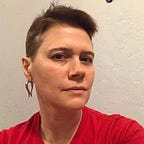Police Uniforms Don’t Belong at Pride.
In 1993, I gave a friend a hug, after she described being pulled out of her car by police and beaten on the side of the road. The sex on her driver’s license didn’t match her gender, and that was all it took. As she told the story, they hadn’t given a reason, they just beat her for being her. But it was ok, she told a room of us in my college’s Pride club. It felt like a rite of passage, because it happened to all the trans people she knew. She said she felt like a real trans woman after that.
That’s how pervasive police violence has been in the lives of queer people — so common, it’s almost validating.
When my partner showed me the New York Times Opinion piece criticizing Pride banning uniformed NYPD I was gobsmacked. It is so wrong-headed, so offensive, and ignorant of the harms it elides and reinforces.
We have come a long way since the time when a police beating was a part of trans validation, but also, we haven’t. For well-off white trans women and men, who are more likely to be able to hold jobs and retain housing, transition can be joyous, a chance to right the feeling of wrongness and be who they are in the world. Gay men and lesbians are widely accepted in western society, able to enjoy the many rights of marriage and a world that, while not at all perfect, doesn’t relegate them to closets and spirals of rejection and self-loathing. One of my dearest friends is a monogamous, married gay man living in New York City, and I tease him — “You’re the new straights now, you know.” He knows. He knows why I tease him, even though he is gay. He’s a middle class white man with a spouse working in the public sector, and I am thrilled for the pure normality of his life.
It’s been a fast transition, but it’s also hard for people outside the gay community to understand how bifurcated the transition has been. My gay New York friend has a lovely, mildly boring life. One of my other friends, a gay man about ten years older than him, died of liver failure after years of drinking to cope with a world (and family) that rejected him for being gay. Much of the queer world, the not straightforwardly-just-gay part of the queer world, is still where the old gays were — in a world that hates them and brutalizes them.
For queer folk in the non-passing community, it often feels like the recently enfranchised and affluent white gays are leaving the rest of the community behind, pulling up the drawbridge and shutting the gate behind them. Non-passing means that you can tell by looking that someone is queer — it might be in their dress, or make up, or the shape of their body. It might be aesthetic choices that make them feel comfortable, or help them communicate who they are, or in how they move. What’s important is that the world — often in the form of the police — still punish or even kill people for not passing, for not fitting into an obvious category. Brutality isn’t a thing that happened once, fifty years ago outside Stonewall, it’s here, now, everyday and everywhere, the lived reality of queers who don’t fit in for whatever reason — too queer, too poor, too dark, too much making the straights (and passing gays) uncomfortable.
For trans, non-gender conforming, or non-binary people who don’t look quite close enough to the white heteronormative standard — clear gender, monogamous partner, maybe a kid or dog — life is dangerous. The police are a threat. And non-passing folk are getting abandoned by many of the more accepted gays, who, having won marriage rights, sometimes forget the job is far from done. I’m a passing queer — bisexual, polyamourus, weakly gendered female, and white. But I’m not, and never will be off the hook. I’m still as much a part of this community as my black drag queen sisters, my white trans brothers, and my latino or asian gender-rejecting siblings. As long as they suffer police brutality, I am in this fight with them.
Here’s the thing: Pride is called Pride because the straight world demands that we be ashamed of ourselves, hate ourselves, even kill ourselves. Pride is a celebratory rebellion against the processes that want to erase us from the world, through physical and economic violence, legal regimes, and yes, through police brutality. The Pride celebration rejects the straight world’s attempts destroy and unmake us. Back when I was co-president my college’s LGBT+**… union, we debated what letters to add to our name. I proposed we drop all the letters, and just call ourselves Pride. That’s what we did, and it felt great — as Pride we were one family, standing up for each other against violence, erasure, and whatever else came our way.
Trans folk, non-binary, and non-passing queers still fear police the world over for good reasons. The murders continue, and police in America and around the world are often disinterested in helping the community at best, and participating in brutality and murder at worst. Of course, it’s hashtag-not-all-police, but the institution of policing sides with the abusers, and there’s countless examples to prove it.
Asking at-risk queers to celebrate themselves on the one time of year they get to do so publicly, in supposed safety, with uniformed police officers in their midst, is more than just tone-deaf. It’s unsafe and cruel. Until both straight people and passing gays understand that, it won’t get better.
Thanks to my Patrons, who make this possible. If you’d like to support this work, head over to my Patreon account.
